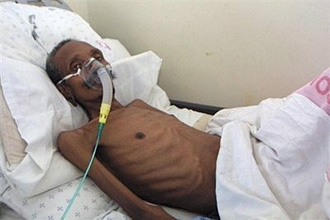
|  |  |  Health & Beauty | March 2009 Health & Beauty | March 2009  
WHO Issues Pessimistic Global Tuberculosis Report
 Bradley Brooks - Associated Press Bradley Brooks - Associated Press
go to original


| | A tuberculosis patient at a hospital in Tugela Ferry, South Africa. Tuberculosis and HIV are sometimes called the 'terrible twins' as the two diseases exacerbate one another. The World Health Organisation has warned that progress in tackling tuberculosis was far too slow, as it doubled its estimate of the ravages the disease is causing among HIV/AIDS patients. (AFP/Rajesh Jantilal) |  |
Rio De Janeiro — The number of people infected with both tuberculosis and HIV is twice what researchers previously thought, top health officials said Tuesday.

The World Health Organization's annual report on TB, presented in Rio, indicates that there were 1.37 million cases of people with both TB and HIV in 2007, the latest year for which statistics are available. About 700,000 people were infected with both in 2006, according to a report released by WHO last year.

Researchers attribute the numbers mostly to more widespread testing and reporting. They say direct information on the HIV status among TB patients is now available from 64 nations – up from just 13 nations in recent years. More reporting is also coming from Africa, where 79 percent of the dual-infection cases were reported.

In 2007, 1.3 million people died from TB, while another 465,000 people who had both TB and HIV died. About 1.5 million people died in 2006 from TB, according to WHO's report last year. It was not clear how many of those who died also were infected with HIV.

WHO researchers said the new data means HIV-positive people are about 20 times more likely than HIV-negative people to develop TB in countries where HIV is at epidemic levels, and between 26 and 37 times more likely to develop TB where HIV prevalence is lower.

In a message to mark World TB Day, U.N. Secretary-General Ban Ki-moon said the epidemic is continuing to decline "but the rate of decline is far too slow, and TB still takes a life every 20 seconds."

"Millions of people are benefiting from treatment through coordinated national efforts, but millions more are still missing out," he said in the message released at U.N. headquarters in New York. "Unless we accelerate action, the numbers of those falling ill will continue to grow."

The WHO's annual report had other pessimistic points: an expected $1.6 billion gap in funding needed to fight the disease this year and an increase in the number of cases of drug-resistant TB.

"We have a situation with very little progress, particularly in Africa and Eastern and Central Europe," said Tido von Schoen-Angerer, the executive director of Doctors Without Borders, who was attending the TB conference. "There is no room anywhere in this report for congratulations."

The survey estimates that 9.27 million people around the globe had TB in 2007 – slightly up from 9.24 million in 2006.

That amounts to a per capita rate of 139 per 100,000 people globally, the report states. That pace, a drop of less than 1 percent a year, has continued for the past several years, said Mario Raviglione, director of the WHO's Stop TB program.

He said it would take millennia to wipe out the disease at that rate.

Multiple-drug-resistant cases of TB also rose in 2007 to 500,000. Such cases are more difficult to treat and have a higher rate of deaths.

Aggravating the fight against TB is the global financial crisis.

Michel Kazatchkine, executive director of the U.N.-backed Global Fund to Fight AIDS, Tuberculosis and Malaria, said funding for programs to fight TB will fall $1.6 billion short in 2009, a gap he estimates will reach at least $4 billion in 2010.

"The crisis is severely affecting developing nations," he said. "But countries should realize health costs are an investment for development and not just a strain on budgets."

Asia registered the most TB cases in 2007, with 55 percent, while Africa had 31 percent. Among nations, India had the most cases with 2 million, China had 1.3 million and Indonesia 530,000.

Associated Press Writer Edith Lederer contributed to this story from the United Nations in New York. |

 |
|  |



